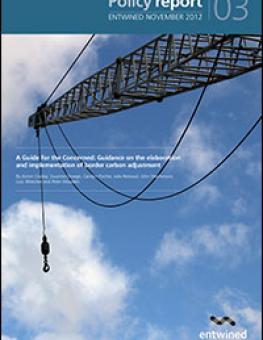
A Guide for the Concerned: Guidance on the elaboration and implementation of border carbon adjustment
When governments take strong unilateral action on climate change, they will always consider border carbon adjustment (BCA) as a means to deal with competitiveness and leakage issues.
But while this tool appears straightforward it is plagued by deeply complex problems in practice, including trade law considerations, methodological challenges and consistency with principles such as common but differentiated responsibility. This guidance is the product of a seven-person international expert drafting group that wrestled with those issues and others for over two years. It goes into rare depth on all the issues that policy-makers would need to consider in building and implementing a regime of BCA. It also serves as a benchmark by which targeted exporters can assess such schemes.
Contents include:
Summary of Recommendations
Starting points
What is BCA?
Why apply BCA?
Criteria for judging BCA regime options
Motivations
Scope of applicability
Exemptions
Identifying goods/sectors to be covered
Determining the level and type of adjustment
Assessing the carbon content
Modifications to the adjustment level
Type of adjustment
Pricing the carbon content
The application of BCA to exports
Use of revenues from import adjustments
Other design guidance
Pre-establishment guidance
Operational guidance
Sunset guidance
Participating experts
You might also be interested in
Agreement on Climate Change, Trade and Sustainability: A landmark pact for trade and sustainability
The ACCTS pact, signed by Costa Rica, Iceland, New Zealand, and Switzerland, aligns trade and environmental policies, tackling fossil fuel subsidies, eco-labels, and green trade.
Addressing Carbon Leakage: A toolkit
As countries adopt ambitious climate policies, this toolkit examines strategies to prevent carbon leakage—when production and emissions shift to nations with weaker climate policies—and explores the trade-offs of each approach.
IISD Trade and Sustainability Review, December 2024
This edition of the IISD Trade and Sustainability Review presents four expert perspectives on how agricultural support and subsidies can promote sustainability in developing and least developed countries.
The Responsible Agricultural Investment Tool for Agribusiness and Case Studies
This report summarizes a collaboration to support agribusinesses in complying with principles of responsible investment in agriculture and food systems.